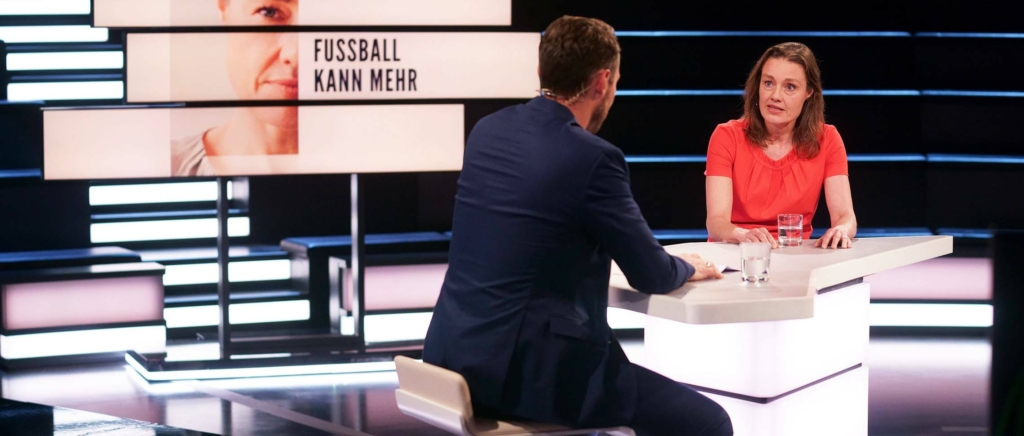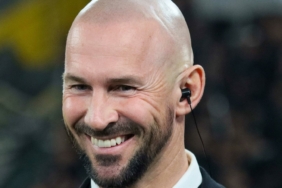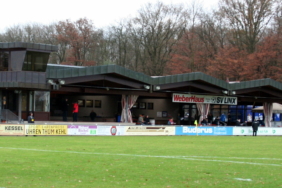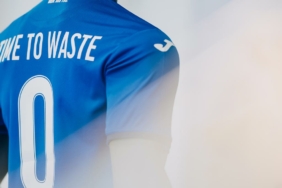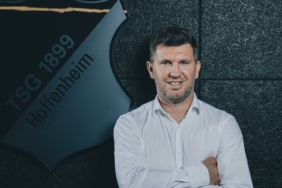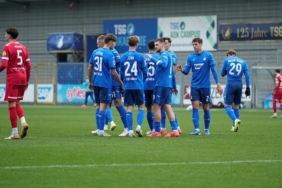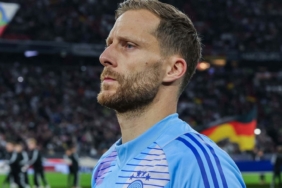Ms Kraus, in May 2021, you founded the non-profit network organisation “FUSSBALL KANN MEHR” along with prominent fellow campaigners and published eight demands for more gender equality and diversity in football. How did this come about?
“I met Gaby Papenburg again after years during a ZDF documentary on the topic of women in football by Claudia Neumann. It was around the same time that then national team goalkeeper Almuth Schult contacted me, and I spoke to Bibi Steinhaus regularly anyway. We were often used as figureheads, but we remained exotic; structurally, there was little development. I then spoke to other women: Sandra Schwedler, the only supervisory board chairwoman in professional football, Helen Breit and Jana Bernhard in order to get to know the perspective of fans and sponsors too. We were in agreement: something had to change in order to make football fit for the future.”
How do you assess the development since the founding almost three years ago?
“FKM has transformed from a strong voice for equality in football to an institution. We are an NGO (non-governmental organisation) that has an impact on organisations and accompanies them on their path to transformation. We now work with nine clubs, the DFL and companies involved in football. More and more managers understand that promoting diversity and women in football is not a charity project, but a necessity. Socially and culturally, but also due to proven economic indicators. It is also important for football clubs to present themselves as modern and innovative employers in the battle for the top people. This includes flexible working models and work-life balance arrangements.”
So everything is moving forward?
“Awareness of these issues is fortunately continuing to grow, but at the same time there are backward steps and struggles for power and control. We still experience a real debate about structural exclusions too rarely. There is also a lack of desire for change.”
What has been the reaction to FKM’s work?
“A lot of encouragement, not only from women. Many men in the industry also recognise the need for change and want to be part of the change. Unfortunately, they often don’t say this loudly enough because the power base in football is still shaped by those who hold a reactionary view. An important step would be for all those who want football to send positive signals instead of lagging a long way behind social developments to make themselves visible.”
What exactly do you do?
“We started with three pillars: We offer a platform where women can exchange ideas. The second pillar is the career-related qualification of women who play football. I’m convinced that this is the generic pool for executives in football, especially in all sporting areas. Up until now, women have earned so little money during their playing careers that they have had to go into employment immediately after their careers. We have therefore developed a programme in which we qualify female players for positions in football during their careers. We cooperate with educational institutions and subsidise scholarships with the help of sponsors. To date, 12 women have completed the relevant programmes, which we’re very pleased about. The third pillar is cooperation with the clubs which aim to promote diversity and women. We accompany this transformation process with our specific experience in the football business. The willingness to set quantitative goals is a prerequisite. Only then will decisions be made in favour of change and women be appointed to decision-making positions. And that’s why we have just entered another field, which is executive recruitment. We’ve realised that women need a special approach to take on leadership roles in football and have founded a joint venture with an established recruitment consultancy.”
Where are you still active?
“We are currently organising an Equality Congress, which will take place in Hamburg during the European Championships and will be an important statement for gender equality. And we are involving many committed people in addition to our full-time colleagues led by our Managing Director Julia Möhn. Above all our advisory board, which includes people from the fields of business, politics and sport – from start-up president Verena Pausder to Thomas Hitzlsperger and Defence Minister Boris Pistorius. They all contribute within the limits of their capabilities. For example, the renowned journalists Gaby Papenburg and Claudia Neumann have set up a female commentator programme for Sky in order to pass on their experience.”
Do you have the feeling that the clubs really advocate for more diversity?
“Football is a results-based sport, you can orientate yourself by the numbers. And if there are four women on the management boards, i.e. 3%, then that is clearly not enough. Furthermore, there is a lack of conviction and imagination when it comes to making personnel decisions in favour of women or people with different profiles. There are no executives without German citizenship. There is still very little appetite for new perspectives.”
Why does it fail in most cases?
“Control and maintaining power. There are only a few of these attractive roles in football. The decision-makers always see the loss of their own sphere of influence first and not the gain that comes from actively shaping change for the greater good, for football.
Can you name an example?
“So many opportunities are missed. The most recent example: there are too few female coaches; even in the Women’s Bundesliga, only one club is coached by a woman. That is due to structural obstacles. The admission criteria for the highest coaching license are almost impossible for women to fulfil. There are 17 men taking part in the DFB’s current Pro License course, no women. The 17th man was given a wild card because he was particularly talented but did not meet the criteria. A second wild card was not awarded, which signals that there are no especially talented female coaches. However, there were female applicants who clearly met the criteria better than the 17th man who was considered. If the DFB misses opportunities like this, all their commitments to promoting women are just lip service.”
Where does the greatest development potential for FKM lie?
“Appointing women to decision-making positions is a crucial lever. Also in order to accelerate all the other diversity dimensions and to strengthen the topic of sustainability.”
How realistic do you think it is to be able to implement the core demands in the near future?
“There are developments that cannot be stopped. The proof of the economic success of diversity in executive positions is clear – across all industries. In football, however, necessary decisions are often delayed with the argument: “We have to look at where we’re coming from.” I’m convinced you have to focus more on the possibilities. If the coach isn’t winning games or the striker isn’t scoring goals, the management react directly. Only in this case is everyone so satisfied with the leisurely pace of change.”
What has changed since your playing career?
“Fortunately, a lot has improved. Of course, I experienced abuse of power and sexism. Starting with the calls to swap shirts after the game, right through to the calls to take off my clothes at my first HSV general meeting. I didn’t address those things at the time because I thought they were part of being in this system. Women are still often told: ‘Be happy that you’re allowed to be here and take part’. We absolutely have to stop being grateful for things that are a matter of course.”
How should women’s football develop?
“The biggest danger is that the Women’s Bundesliga is a reflection of the economic power of the Men’s Bundesliga. It has to function as a business model in its own right. Above all, this requires people who have a decided interest in making this league successful: economically, but also reputationally. And only if this independence is given will the players develop a different self-image. Because they are conditioned to be grateful. For the fact that they are allowed to train on the pitch, that they have a physiotherapist as well. With a different self-image for their own sport, their demeanour will also change. On the pitch too.”
How much of a niche is good and how many adjustments to men’s football are necessary for professionalisation?
“Women are not fundamentally the better people. They have just not been exposed to corruption factors to the same extent. And that’s why it’s important to develop their own identity. What should women’s football look like? What is adopted from men’s football and what is decidedly not? What role do advisors play? How can proximity be guaranteed? How do you create fair competition? I think it’s primarily the players who have to deal with these questions. They should decide what women’s football should be like, not people who discuss it vicariously.”

Jetzt 11 Ausgaben kostenlos* abonnieren!
(*jahrliche Bezugskosten nur 18,99 €)

